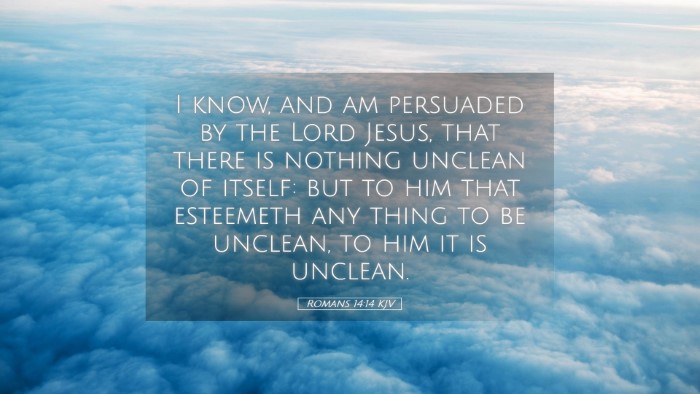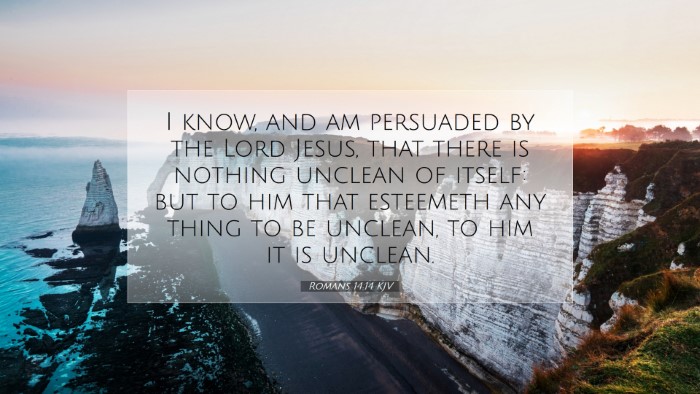Old Testament
Genesis Exodus Leviticus Numbers Deuteronomy Joshua Judges Ruth 1 Samuel 2 Samuel 1 Kings 2 Kings 1 Chronicles 2 Chronicles Ezra Nehemiah Esther Job Psalms Proverbs Ecclesiastes Song of Solomon Isaiah Jeremiah Lamentations Ezekiel Daniel Hosea Joel Amos Obadiah Jonah Micah Nahum Habakkuk Zephaniah Haggai Zechariah MalachiRomans 14:14
Romans 14:14 KJV
I know, and am persuaded by the Lord Jesus, that there is nothing unclean of itself: but to him that esteemeth any thing to be unclean, to him it is unclean.
Romans 14:14 Bible Commentary
Commentary on Romans 14:14
Verse: "I know and am persuaded by the Lord Jesus that there is nothing unclean of itself: but to him that esteemeth any thing to be unclean, to him it is unclean." (Romans 14:14, KJV)
Introduction
The Apostle Paul addresses the issue of Christian liberty and the role of personal conscience in Romans 14. His main focus lies in how believers should relate to each other regarding non-essential matters such as dietary laws and special days. Romans 14:14 serves as a crucial verse highlighting the principle that spiritual cleanliness and uncleanness are not inherently based on the substance of food but on one’s personal conviction and understanding.
Exegesis of Romans 14:14
This verse emphasizes the significance of conscience in the life of a believer. Paul declares his understanding that nothing is unclean in itself, reflecting his belief that Christ has freed Christians from the Old Testament ceremonial law. However, he also recognizes that an individual's perspective may deem something as unclean, particularly if it contradicts their faith or understanding.
The Principle of Liberty
- Understanding Clean and Unclean: Paul’s statement that "there is nothing unclean of itself” aligns with Jesus’ teaching in Mark 7:18-19, where he declared all foods clean. Paul confirms that the Old Testament dietary restrictions do not apply in the same way to New Covenant believers.
- Personal Conviction Matters: Yet, Paul immediately counters his assertion by recognizing that to the one who regards something as unclean, it is unclean. This underscores a vital principle—personal conviction shapes one's experience of spiritual matters.
The Role of Conscience
Conscience plays a vital role in the believer’s life. As Albert Barnes notes, the conscience can either endorse actions or condemn them based on one’s beliefs. Paul’s teaching urges believers to be sensitive to their own conscience and that of others.
Practical Application
For pastors, students, and scholars, this verse encourages an ongoing dialogue about Christian freedom and responsibility. The following practical applications emerge:
- Tolerance and Understanding: Emphasizing tolerance in matters of personal conviction invites believers to respect one another’s differing views rather than causing division over non-essentials.
- Encouragement of Personal Reflection: Pastors can encourage congregants to reflect on their own understanding of what they consider clean and unclean, fostering a deeper, more personal faith experience.
- Guidance Against Legalism: It serves as a warning against legalism, urging believers to understand that imposing rules based on personal convictions onto others may lead to spiritual oppression.
Theological Implications
- Unity in Diversity: Paul’s sentiments in this verse promote unity among believers despite differences in practices or views on secondary issues. The church ought to celebrate diversity that reflects various perspectives while centering around core doctrines of the faith.
- Sanctification and Growth: The passage implies that sanctification is a personal process and varies among believers. Maturity in faith does not manifest in uniformity of practice but in the ability to respect and love across differences.
Conclusion
Romans 14:14 serves as a profound reminder of the nuances involved in Christian liberty. The verse encapsulates a balance between understanding the grace of Christ’s work in declaring all things clean while recognizing the role of individual conviction in determining how one interacts with their faith and community.
As we engage with this Scripture, believers are encouraged to embrace a spirit of grace that values conscience, fosters unity inChrist, and allows for differences without stumbling into judgment or division.


